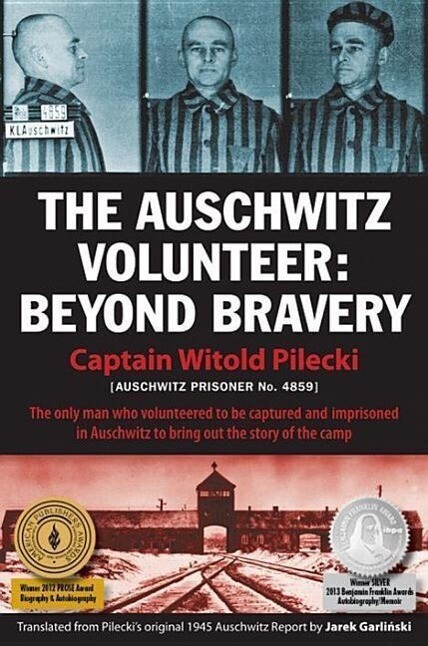
Zustellung: Mo, 10.02. - Sa, 15.02.
Versand in 3-4 Wochen
VersandkostenfreiBestellen & in Filiale abholen:
Soldier, Patriot...
Husband, Father...Hero
Captain Witold Pilecki-the only man who volunteered to be captured and imprisoned in Auschwitz to bring out the story of the camp.
September 1940. With calm deliberation, Polish Army officer Witold Pilecki walked into a Nazi German street round-up in Warsaw...and became Auschwitz Prisoner No. 4859.
Pilecki had volunteered for a potentially suicidal secret undercover mission for the Polish Underground: smuggle out intelligence about this new German concentration camp, and build a resistance organization among the prisoners.
Barely surviving nearly three years of hunger, disease and brutality, Pilecki accomplished his mission before escaping in April 1943.
His clandestine intelligence reports from Auschwitz, received by the Allies beginning in 1941, were among the earliest, including the full horrors of daily life inside the camp, the killing of Soviet soldiers taken as prisoners of war, the building of the gas chambers and mass extermination of the Jews brought to the camp.
Pilecki's most comprehensive report on Auschwitz, written for his Polish Army superiors in 1945, is being published here in English for the first time.
"A shining example of heroism that transcends religion, race and time."
- Rabbi Michael Schudrich, Chief Rabbi of Poland
Husband, Father...Hero
Captain Witold Pilecki-the only man who volunteered to be captured and imprisoned in Auschwitz to bring out the story of the camp.
September 1940. With calm deliberation, Polish Army officer Witold Pilecki walked into a Nazi German street round-up in Warsaw...and became Auschwitz Prisoner No. 4859.
Pilecki had volunteered for a potentially suicidal secret undercover mission for the Polish Underground: smuggle out intelligence about this new German concentration camp, and build a resistance organization among the prisoners.
Barely surviving nearly three years of hunger, disease and brutality, Pilecki accomplished his mission before escaping in April 1943.
His clandestine intelligence reports from Auschwitz, received by the Allies beginning in 1941, were among the earliest, including the full horrors of daily life inside the camp, the killing of Soviet soldiers taken as prisoners of war, the building of the gas chambers and mass extermination of the Jews brought to the camp.
Pilecki's most comprehensive report on Auschwitz, written for his Polish Army superiors in 1945, is being published here in English for the first time.
"A shining example of heroism that transcends religion, race and time."
- Rabbi Michael Schudrich, Chief Rabbi of Poland
Inhaltsverzeichnis
VII. Table of Contents
CONTENTS
Introduction by Norman Davies ................................................. xi
Foreword by Rabbi Michael Schudrich, Chief Rabbi of Poland ............. xv
Translator's Introductory Note ................................................... xix
Publisher's Note .................................................................... xxiii
Selected Highlights from Pilecki's 1945 Report ............................... xxix
List of Maps ......................................................................... xxxi
Historical Horizon
Captain Witold Pilecki: The Report, the Mission, the Man .......... xxxiii
Captain Pilecki's Covering Letter
to Major General Tadeusz Pelczynski ................................. 1
Captain Witold Pilecki's 1945 Auschwitz Report ............................. 5
Appendices
1 Glossary of English, German and Polish Terms
and Acronyms ............................................................335
2 German-Language Positions and Ranks at Auschwitz
Mentioned by Pilecki ....................................................343
3 Index of People and Places Referred to by Pilecki
with Either a Code Number or Letter ..................................345
4 Chronology of Pilecki's 1945 Report .......................................355
Index .................................................................................365
Discussion Questions ..............................................................397
LIST OF MAPS
Europe 1939 ...................................................... vi
Poland-September 1939 ...................................... ix
Occupied Poland 1939-1941 ................................. x
Auschwitz and Environs-1944 ............................... 9
KL Auschwitz 1 ................................................. 10
Pilecki's Escape Route from Auschwitz .....................300
CONTENTS
Introduction by Norman Davies ................................................. xi
Foreword by Rabbi Michael Schudrich, Chief Rabbi of Poland ............. xv
Translator's Introductory Note ................................................... xix
Publisher's Note .................................................................... xxiii
Selected Highlights from Pilecki's 1945 Report ............................... xxix
List of Maps ......................................................................... xxxi
Historical Horizon
Captain Witold Pilecki: The Report, the Mission, the Man .......... xxxiii
Captain Pilecki's Covering Letter
to Major General Tadeusz Pelczynski ................................. 1
Captain Witold Pilecki's 1945 Auschwitz Report ............................. 5
Appendices
1 Glossary of English, German and Polish Terms
and Acronyms ............................................................335
2 German-Language Positions and Ranks at Auschwitz
Mentioned by Pilecki ....................................................343
3 Index of People and Places Referred to by Pilecki
with Either a Code Number or Letter ..................................345
4 Chronology of Pilecki's 1945 Report .......................................355
Index .................................................................................365
Discussion Questions ..............................................................397
LIST OF MAPS
Europe 1939 ...................................................... vi
Poland-September 1939 ...................................... ix
Occupied Poland 1939-1941 ................................. x
Auschwitz and Environs-1944 ............................... 9
KL Auschwitz 1 ................................................. 10
Pilecki's Escape Route from Auschwitz .....................300
Produktdetails
Erscheinungsdatum
15. April 2012
Sprache
englisch
Seitenanzahl
460
Autor/Autorin
Captain Witold Pilecki
Übersetzung
Jarek Garlinski
Solist/Solistin
Norman Davies
Verlag/Hersteller
Produktart
gebunden
Gewicht
1002 g
Größe (L/B/H)
235/165/43 mm
ISBN
9781607720096
Entdecken Sie mehr
Bewertungen
0 Bewertungen
Es wurden noch keine Bewertungen abgegeben. Schreiben Sie die erste Bewertung zu "The Auschwitz Volunteer: Beyond Bravery" und helfen Sie damit anderen bei der Kaufentscheidung.










